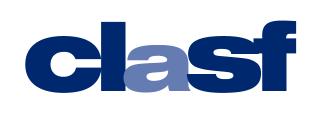
Modernising European Competition Law
A CLaSF Workshop
Glasgow, Friday 25th April 2003
CLaSF’s first workshop on ‘Modernising European competition Law’ Friday 25th April 2003 at the Law School, University of Strathclyde Glasgow was undoubtedly a great success. There were seventeen participants in total, including established and younger competition law academics and representatives from the event’s co-sponsors, MacLay Murray and Spens Solicitors, Glasgow.
The event was chaired by Professor Barry Rodger of Strathclyde University Law School, by welcoming everyone to the event and to CLaSF. The general aims and background to the establishment of CLaSF as an association of dedicated competition law academics were outlined. It was pointed out that membership of the forum was growing steadily, that there were already over twenty full members and that membership was not confined to UK academics. Participants were advised of the range of different ways in which we envisage expanding the value of the website: by increasing the number of linkages to related websites and organisations; to display lists of recent and forthcoming publications by members and additionally, when a secured site is organised, as a forum for discussion and feedback on draft papers by forum members.
The workshop started with a paper by Professor Phillipa Watson, 'The Reform of EC Competition law: Timely and Prudent?' ‘Nottingham Law School which set the background for more specific consideration of Regulation 1/2003 in subsequent papers. Mr Silvere Lefevre, University of Dundee, considered the extent to which legal certainty may be compromised by the abolition of notification in his paper ‘Self-assessment of compatibility of business transactions with EC Competition Law under Regulation 1/2003: is the situation that bad?’ Professor Chris Bovis, Lancashire Law School in his paper ‘The Danger of Nationalization of EU Competition Law and Policy through a Decentralized application and enforcement regime’ revisited the grander issue of Community competition policy in a restructured institutional setting. which set the background for more specific consideration of Regulation 1/2003 in subsequent papers. Dr Alan Riley, Nottingham Law School, followed with a stinging critique of the Commission in his paper ‘EU Antitrust Modernisation: The Commission Does Very Nicely, Thank You!’. Dr Oswald Jansen, Utrecht University, provided a fascinating account of the difficulties to be faced in pursuing fines across the new NCA network in his paper entitled ‘The systems of international cooperation in administrative and criminal matters in relation to regulation 1/2003’. Professor Peter Kunzlik, Nottingham Law School, concluded the section on the Regulation with a fascinating account of the links between the Community developments and the wider search for global competition norms and institutions in his paper ‘Regulation 1/2003: Modernisation in an Era of Globalisation’.
Another important facet of the ongoing modernisation of Community competition law is the Merger Regulation reform process. This topicality was recognised by the inclusion of two further papers on this general theme. Dr Herwig Hoffman, Trinity College, Dublin, in ‘Good Governance in European Merger Control- Due Process and Checks and Balances under Review’ provided a detailed critique of the European merger process. Subsequently Dr Andrew Scott, Norwich Law School, dissected key elements of the reform debate, in particular focusing on the key question of the scope for consideration of merger efficiencies, in ‘Smoke and Mirrors: The EC Merger Reform Package.’
Professor Rodger concluded by advising that negotiations were currently underway with a publisher for the institution of a new twice-yearly journal. The idea would be for the journal articles to be drawn largely, although not exclusively, from workshop papers. Participants agreed that they would finalise and retain their papers, where possible, in the meantime, for future publication in a CLaSF journal.
It was agreed that the next workshop would take place on September 11th at Nottingham law School in Gray’s Inn, London. Members would be consulted as to an appropriate topic for the workshop. The Management committee would also hold a meeting in September around the workshop to discuss progress and the way forward generally for CLaSF.
The workshop formally ended after thanks to MacLay Murray and Spens and Strathclyde Law School for their financial support. Participants continued on to a local hostelry and thereafter to dinner to continue discussions. It was agreed that the workshop was a great success, both in terms of the quality of papers presented and also as a formal and informal forum for discussion and socialising with other competition law academics in a focused yet friendly environment.
The CLaSF would like to thank the following sponsors for supporting the event:-
• ©2003-2009 Angus MacCulloch & Andrew
Matthews •

